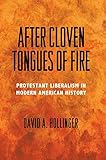After Cloven Tongues of Fire : Protestant Liberalism in Modern American History / David A. Hollinger.
Material type: TextPublisher: Princeton, NJ : Princeton University Press, [2013]Copyright date: ©2013Edition: Course BookDescription: 1 online resourceContent type:
TextPublisher: Princeton, NJ : Princeton University Press, [2013]Copyright date: ©2013Edition: Course BookDescription: 1 online resourceContent type: - 9780691158426
- 9781400845996
- 280.40973 23
- BR525 .H63 2017
- online - DeGruyter
- Issued also in print.
| Item type | Current library | Call number | URL | Status | Notes | Barcode | |
|---|---|---|---|---|---|---|---|
 eBook
eBook
|
Biblioteca "Angelicum" Pont. Univ. S.Tommaso d'Aquino Nuvola online | online - DeGruyter (Browse shelf(Opens below)) | Online access | Not for loan (Accesso limitato) | Accesso per gli utenti autorizzati / Access for authorized users | (dgr)9781400845996 |
Browsing Biblioteca "Angelicum" Pont. Univ. S.Tommaso d'Aquino shelves, Shelving location: Nuvola online Close shelf browser (Hides shelf browser)

|

|

|

|

|

|

|
||
| online - DeGruyter A Glossary of Chickens : Poems / | online - DeGruyter A Short Life of Kierkegaard / | online - DeGruyter Aboutness / | online - DeGruyter After Cloven Tongues of Fire : Protestant Liberalism in Modern American History / | online - DeGruyter Aristotle : His Life and School / | online - DeGruyter Climbing Mount Laurel : The Struggle for Affordable Housing and Social Mobility in an American Suburb / | online - DeGruyter Come Out Swinging : The Changing World of Boxing in Gleason's Gym / |
Frontmatter -- Contents -- Preface -- Chapter 1. The Accommodation of Protestant Christianity with the Enlightenment: An Old Drama Still Being Enacted -- Chapter 2. After Cloven Tongues of Fire: Ecumenical Protestantism and the Modern American Encounter with Diversity -- Chapter 3. The Realist-Pacifist Summit Meeting of March 1942 and the Political Reorientation of Ecumenical Protestantism in the United States -- Chapter 4. Justification by Verification: The Scientific Challenge to the Moral Authority of Christianity in Modern America -- Chapter 5. James, Clifford, and the Scientific Conscience -- Chapter 6. Damned for God's Glory: William James and the Scientific Vindication of Protestant Culture -- Chapter 7. Communalist and Dispersionist Approaches to American Jewish History in an Increasingly Post-Jewish Era -- Chapter 8. Church People and Others -- Chapter 9. Enough Already: Universities Do Not Need More Christianity -- Chapter 10. Religious Ideas: Should They Be Critically Engaged or Given a Pass? -- Epilogue: Reinhold Niebuhr and Protestant Liberalism -- Index
restricted access online access with authorization star
http://purl.org/coar/access_right/c_16ec
The role of liberalized, ecumenical Protestantism in American history has too often been obscured by the more flamboyant and orthodox versions of the faith that oppose evolution, embrace narrow conceptions of family values, and continue to insist that the United States should be understood as a Christian nation. In this book, one of our preeminent scholars of American intellectual history examines how liberal Protestant thinkers struggled to embrace modernity, even at the cost of yielding much of the symbolic capital of Christianity to more conservative, evangelical communities of faith. If religion is not simply a private concern, but a potential basis for public policy and a national culture, does this mean that religious ideas can be subject to the same kind of robust public debate normally given to ideas about race, gender, and the economy? Or is there something special about religious ideas that invites a suspension of critical discussion? These essays, collected here for the first time, demonstrate that the critical discussion of religious ideas has been central to the process by which Protestantism has been liberalized throughout the history of the United States, and shed light on the complex relationship between religion and politics in contemporary American life. After Cloven Tongues of Fire brings together in one volume David Hollinger's most influential writings on ecumenical Protestantism. The book features an informative general introduction as well as concise introductions to each essay.
Issued also in print.
Mode of access: Internet via World Wide Web.
In English.
Description based on online resource; title from PDF title page (publisher's Web site, viewed 08. Jul 2019)


